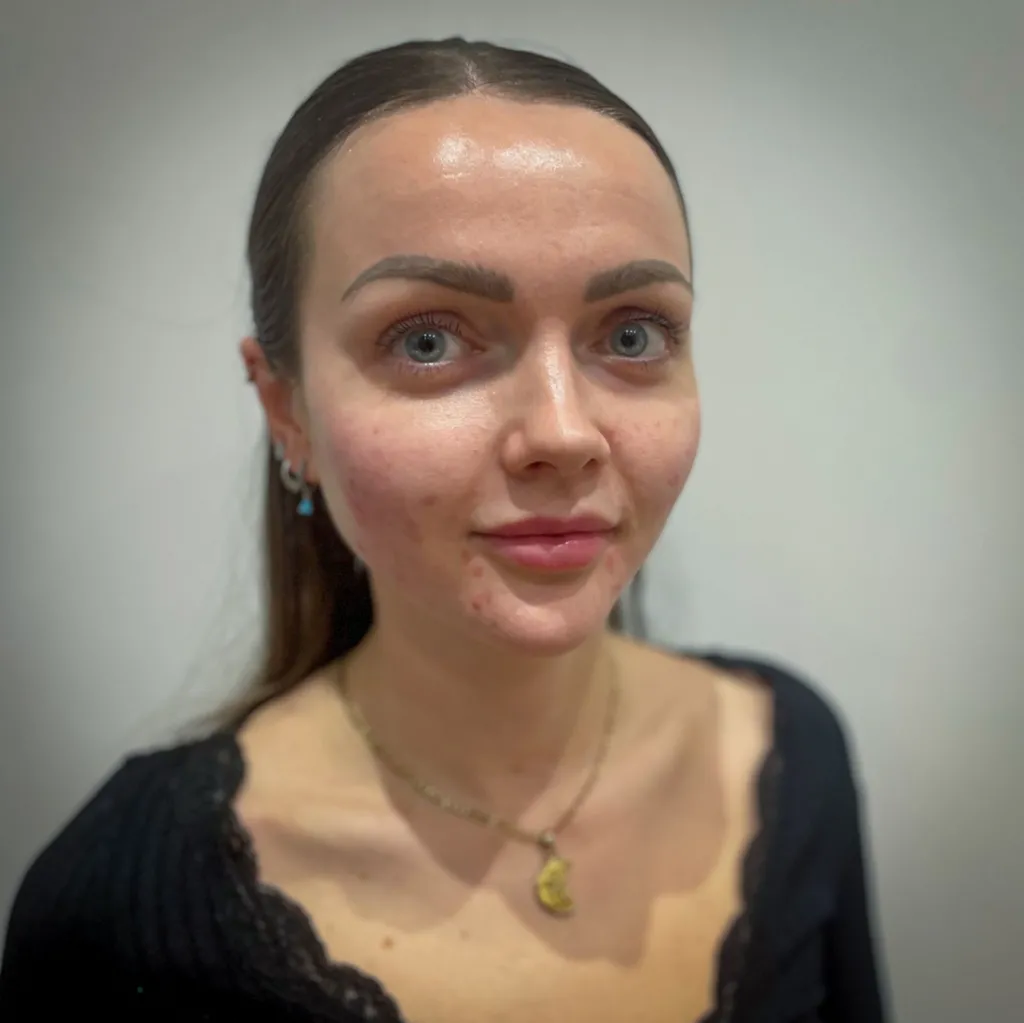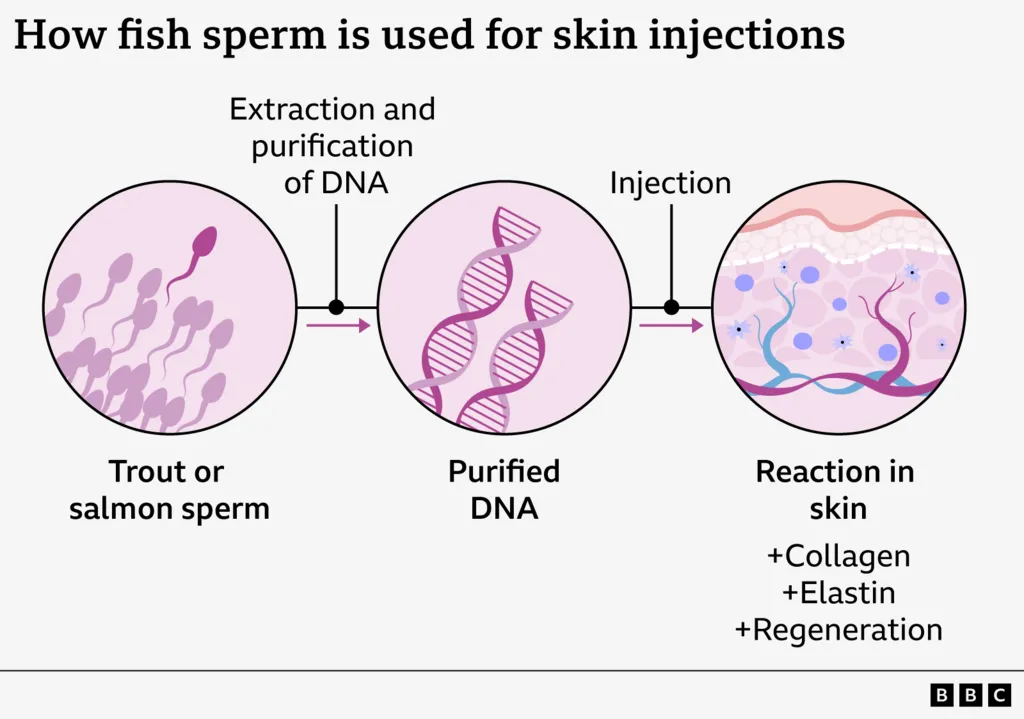
In my many years as a journalist, I never thought I would be asking someone how it feels to have trout sperm injected into their face.
And yet, here I am.
Abby Warnes is lying on a large, black padded chair at a small aesthetics clinic in south Manchester.
She winces as a small cannula is delicately inserted into her cheek.
"Ouch. Ouch," she exclaims.
I should make it clear that 29-year-old Abby is not actually receiving a pure dose of trout sperm.
The lower part of her face is being injected with tiny fragments of DNA, known as polynucleotides, which have been extracted from either trout or salmon sperm.
Why? Well, interestingly, our DNA is pretty similar to that of a fish.
So the hope is Abby's body will not only welcome these tiny strands of fish DNA, her skin cells will be spurred into action, producing more collagen and elastin, two proteins which are vital for maintaining the structural integrity of our skin.
For Abby, the aim is to freshen her skin, keep it healthy, and hopefully, treat the acne she's lived with for many years by reducing scarring and redness.
"I just want to target those problem areas," she explains.
Polynucleotides are being touted as the next big skincare "miracle" and are rapidly gaining popularity after a number of celebrities have spoken candidly about their "salmon sperm facials".
Earlier this year, Charli XCX told her nine million Instagram followers that she felt "fillers are kind of over now", and explained she had moved onto polynucleotides, which are "kinda like deep vitamins".
Kim and Khloe Kardashian are also reportedly avid fans. And when asked about her skincare routine on a recent episode of Jimmy Kimmel Live, Jennifer Aniston responded: "Don't I have beautiful salmon skin?"
So, despite their fishy beginnings, are polynucleotides transforming skincare?
"We are having a Benjamin Button moment," Suzanne Mansfield, who works for aesthetics company Dermafocus, tells me.
That's a reference to the 2008 film The Curious Case of Benjamin Button, where Brad Pitt plays a man who ages backwards. By the time he's in his later years, he has the skin of a baby's bottom.
While such an effect is highly unlikely and would probably be a tad disconcerting, Ms Mansfield says polynucleotides are forging the way when it comes to regenerative skincare.
A small but growing body of research and clinical trials suggest that injecting polynucleotides can rejuvenate skin, not only making it healthier but potentially reducing fine lines, wrinkles and scars.
"All we are doing, by using it in the aesthetics industry," she says, "is enhancing something the body already does. That's why these are so special."
But they also come with a pretty hefty price tag.
A single session of polynucleotide injections can cost anywhere from £200 to £500 - and it's recommended you have three of these over several weeks.
After that clinics tend to advise you need to top up every six to nine months to maintain the look.
Back at the clinic, Abby's treatment is almost finished.
"Just one area left," Helena Dunk, the aesthetic nurse practitioner who owns the clinic, Skin HD, reassures her.
She says polynucleotides have massively increased in popularity over the past 18 months.
"Half my clients really notice a huge difference - their skin feels more hydrated, healthier, younger - while the other half don't see such a big change. But their skin does tend to feel tighter and fresher."
Abby has already had the area under her eyes injected as part of a three-course treatment at the clinic - and she's really pleased with the results.
She received lots of tiny injections of polynucleotides, which was a "pretty painful procedure", but says it's helped reduce the dark circles under her eyes.
While a growing number of studies consider it a safe and effective treatment, it is still relatively new and some experts warn the hype may be outpacing the science.

Consultant dermatologist Dr John Pagliaro, based in Brisbane, Australia, says that while we know that nucleotides play an important role in our bodies - they are the building blocks of our DNA for a start - he questions whether "injecting salmon DNA, cut into little pieces" into our faces is going to work as well as our own nucleotides.
"We do not have good, strong data," he says. "As a medical specialist, I would want to see at least a few more years of big, credible studies showing safety and efficacy before I started using them in my practice. We're just not there yet."
Charlotte Bickley describes her foray into the world of polynucleotides as "salmon-gate".
The 31-year-old from New York had the treatment last year as part of her "wedding glow up", shortly before she was due to get married.
But Charlotte ended up with a skin infection, inflammation and darker rings under her eyes than before she had the treatment.
"I got the complete opposite of what I wanted," she says. "I trusted that doctor, but he's left me scarred."
Charlotte believes she was injected too deeply under her eyes, causing a negative reaction. There can be side effects - such as redness, swelling and bruising but these tend to be temporary.
In some cases, people can have an allergic reaction, or, if polynucleotides are not injected properly, there are longer term risks, such as skin pigmentation and infections.
Polynucleotides are widely used across the UK. They are registered as medical devices with the Medicines Health and Regulatory Authority (MHRA) but they are not regulated like medicines.
They have not been approved by the UK’s equivalent in the US, the Food and Drug Administration (FDA).
"I just keep thinking, 'Why did I go through with it?'" Charlotte says. "When something goes wrong on my face I hyperfixate on it."
She's paid thousands in medical bills to try to rectify the situation, but 10 months on, there's still some scarring below her eyes.
"I would never have salmon DNA injected into my face again," Charlotte says, "ever."
Ashton Collins, director of Save Face, an organisation which campaigns for better regulation of the cosmetic industry and who runs a government-approved register of clinics in the UK, says polynucleotides are generally considered a safe treatment when administered by a medically-trained professional and the brand of polynucleotides used is from a reputable company.
"But, we are now seeing products coming onto the market that haven't been tested properly, that's the worry," she says.
Dr Sophie Shotter, president of the British College of Aesthetic Medicine, agrees.
"Due to the lack of regulation, anyone can use products that have not been robustly tested. It is a real issue."
In her opinion, are polynucleotides effective though?
"I have them on my shelf, in my toolbox. I definitely offer them to clients, who want a natural look and want to potentially invest long-term," Dr Shotter says.
"Polynucleotides as a treatment is not the panacea. There are plenty of other treatments out there that can do similar, and have more data behind them."
There is no one treatment that will work for everyone, she adds.
"We all respond differently to different things, and that is not always predictable."














